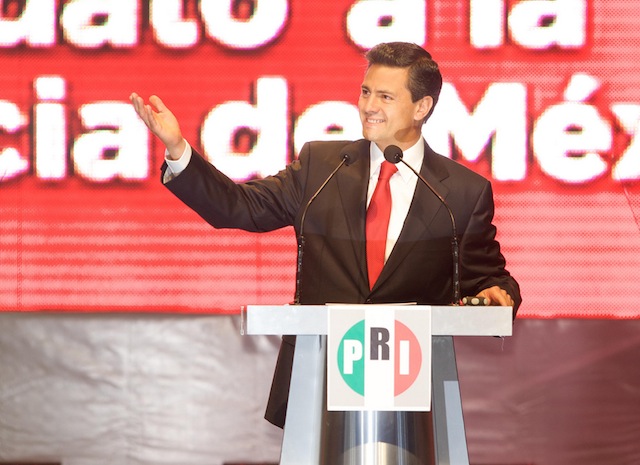
It’s taken a dozen years, but Mexicans have reached the same conclusion that Russians came to in the 1990s and that Egyptians came to after their recent elections: Democracy is overrated.
On July 1, barring some unexpected development, Mexico will vote back into the presidency the authoritarian PRI, the cynically named Party of the Institutional Revolution, which governed Mexico for seven decades, until the year 2000.
That the famously corrupt PRI can be competitive after being so thoroughly discredited during its final years in power is an impressive, if tragic, tribute to the failures of Mexico’s democracy. Powerbrokers in Mexico’s 32 states, after 70 years of authoritarian rule, remained obstinately resistant to the rule of law. The left, unlike in many other Latin American countries, never offered a compelling alternative for middle-class voters. And, worst of all, the current administration never managed to stem the rising violence associated with the drug trade.
The stunning comeback of the PRI heralds what political scientist Denise Dresser has aptly termed the “Putinization” of Mexico, as in Vladimir Putin. Millions of Mexicans yearn for the good old days when competent, ruthless people had the country under control. The PRI’s mastery of power (predicated on the novel concept of depersonalizing its control by switching out its president every six years) was called the “perfect dictatorship” by Peruvian author Mario Vargas Llosa. Robert Caro, America’s bestselling chronicler of how power is exercised, would have found it inspiring.
It helps that Enrique Peña Nieto, the 45-year-old PRI frontrunner and former governor of the state of Mexico, is one of the more disciplined and talented campaigners roaming the planet in 2012. (His movie-star looks don’t hurt.) Peña Nieto is indefatigable in his assurances that the new PRI is not the old PRI and that there’s no going back to less democratic times, even as his record–and the presence of so many dinosaurios within the PRI–belies such claims. One of the more picaresque Peña Nieto gambits has been to issue a manifesto proclaiming that he will respect the constitution–and then hold a public ceremony to have the manifesto notarized. He must really mean it! How reassured would you feel if Mitt Romney went around the country pledging to respect the Bill of Rights and putting on a show of having his pledge notarized?
Mexican college kids, appalled by the PRI’s comeback, have occupied social media and taken to the streets calling for a “Mexican Spring.” Trouble is, Mexico had its spring in 2000. Free elections are not the issue; popular sentiment is. Polls show the candidate of the left, former Mexico City mayor Andrés Manuel Lopez Obrador, running some 12-15 points behind Peña Nieto in a three-way race. (Lopez Obrador came awfully close to winning in the last presidential election, in 2006, but then refused to accept the results and threw a spectacular and costly temper tantrum that included massive street protests and his self-proclamation as the country’s “legitimate president.”)
Josefina Vázquez Mota, the conservative PAN (Partido Acción Nacional) party’s candidate now that President Felipe Calderón is reaching the end of his six-year term, has an appealing personality, but she has proven a weak campaigner with an incoherent, ever-changing pitch. She hovers about the 25-percent mark, slightly behind López Obrador, in most polls. That leaves the PRI.
To some degree, disaffection with post-PRI rule has been unfair. Certainly, the PAN deserves more credit than it gets for its economic record. Mexico’s middle class has expanded rapidly in recent years, with more and more people gaining access to affordable mortgages, car loans, and other forms of consumer credit while enjoying stable incomes. The last dozen years have been free of the economic implosions that were common during the last two decades of PRI rule.
But this is overshadowed by all the daily headlines of the violent mayhem–which has claimed nearly 60,000 victims in the last six years–surrounding the fight against the drug cartels. That’s a major reason why the bad old PRI is looking not so bad after all. Peña Nieto says the war must continue and that there is no possibility of making an under-the-table peace deal with the cartels, but he adds, a bit obliquely, that he will wage the war more effectively. I’m reminded of Richard Nixon in 1968 and his secret plan to end the war in Vietnam.
In truth, no one imagines an escalation on the part of the Mexican government. When the PRI ruled the entire country, drug lords abounded, but there weren’t turf battles between federal, state, and local governments governed by different parties. For most Mexicans, that arrangement looks appealing in hindsight. They feel the current war is one that the Americans outsourced to them to fight, and they prefer to vote in the PRI and have it outsource the war right back across the border.
As the novelist Carlos Fuentes always reminded us, Mexican culture has a near-mystical ability to accommodate the co-existence of all tenses. It’s a good fit for the ideological elasticity and resilience of the PRI’s “institutionalized revolution,” which can appear to be all things to all people. Yesterday is now tomorrow–in a country where the unresolved past, the chaotic present, and the unrealized future haunt each other in real time, or rather, in tiempo mexicano.
Andrés Martinez is the editorial director of Zócalo Public Square and a vice president at the New America Foundation.
*Photo courtesy of Angélica Rivera de Peña.




Send A Letter To the Editors